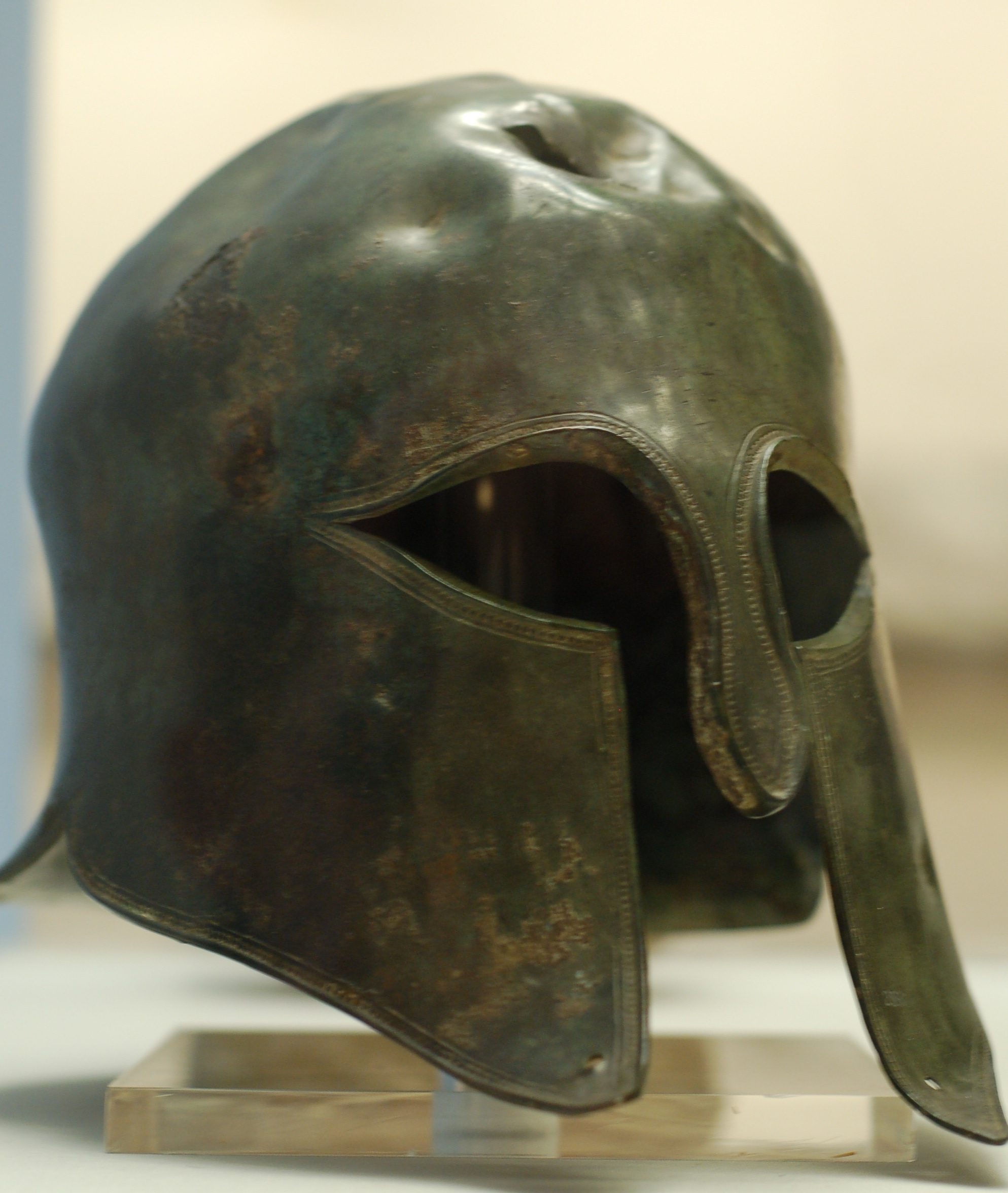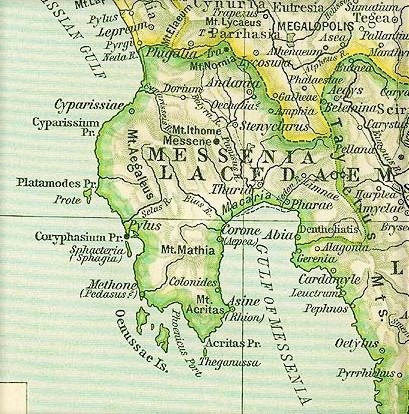 |
Spartan Army
The Spartan army stood at the center of the Spartan state, citizens trained in the disciplines and honor of a warrior society.Connolly (2006), p. 38 Subjected to military drills since early manhood, the Spartans became one of the most feared and formidable military forces in the Greek world, attaining legendary status in their wars against Persia. At the height of Sparta's power – between the 6th and 4th centuries BC – other Greeks commonly accepted that "one Spartan was worth several men of any other state." Tradition states that the semi-mythical Spartan legislator Lycurgus first founded the iconic army. Referring to Sparta as having a "wall of men, instead of bricks," he proposed reforming the Spartan society to develop a military-focused lifestyle following "proper virtues" such as equality for the male citizens, austerity, strength, and fitness. Spartan boys deemed strong enough entered the '' agoge'' regime at the age of seven, undergoing intense and rigor ... [...More Info...] [...Related Items...] OR: [Wikipedia] [Google] [Baidu] |
 |
Spartan Helmet 2 British Museum
Sparta ( Doric Greek: Σπάρτα, ''Spártā''; Attic Greek: Σπάρτη, ''Spártē'') was a prominent city-state in Laconia, in ancient Greece. In antiquity, the city-state was known as Lacedaemon (, ), while the name Sparta referred to its main settlement on the banks of the Eurotas River in Laconia, in south-eastern Peloponnese. Around 650 BC, it rose to become the dominant military land-power in ancient Greece. Given its military pre-eminence, Sparta was recognized as the leading force of the unified Greek military during the Greco-Persian Wars, in rivalry with the rising naval power of Athens. Sparta was the principal enemy of Athens during the Peloponnesian War (431–404 BC), from which it emerged victorious after the Battle of Aegospotami. The decisive Battle of Leuctra in 371 BC ended the Spartan hegemony, although the city-state maintained its political independence until its forced integration into the Achaean League in 192 BC. The city nevertheless ... [...More Info...] [...Related Items...] OR: [Wikipedia] [Google] [Baidu] |
|
Iliad
The ''Iliad'' (; grc, Ἰλιάς, Iliás, ; "a poem about Ilium") is one of two major ancient Greek epic poems attributed to Homer. It is one of the oldest extant works of literature still widely read by modern audiences. As with the '' Odyssey'', the poem is divided into 24 books and contains 15,693 lines in its most widely accepted version, and was written in dactylic hexameter. Set towards the end of the Trojan War, a ten-year siege of the city of Troy by a coalition of Mycenaean Greek states, the poem depicts significant events in the siege's final weeks. In particular, it depicts a fierce quarrel between King Agamemnon and a celebrated warrior, Achilles. It is a central part of the Epic Cycle. The ''Iliad'' is often regarded as the first substantial piece of European literature. The ''Iliad'', and the ''Odyssey'', were likely written down in Homeric Greek, a literary amalgam of Ionic Greek and other dialects, probably around the late 8th or early 7th century BC. ... [...More Info...] [...Related Items...] OR: [Wikipedia] [Google] [Baidu] |
|
 |
Messenia
Messenia or Messinia ( ; el, Μεσσηνία ) is a regional unit (''perifereiaki enotita'') in the southwestern part of the Peloponnese region, in Greece. Until the implementation of the Kallikratis plan on 1 January 2011, Messenia was a prefecture (''nomos'') covering the same territory. The capital and largest city of Messenia is Kalamata. Geography Physical Messenia borders on Elis to the north, Arcadia to the northeast, and Laconia to the southeast. The Ionian Sea lies to the west, and the Gulf of Messinia to the south. The most important mountain ranges are the Taygetus in the east, the Kyparissia mountains in the northwest and the Lykodimo in the southwest. The main rivers are the Neda in the north and the Pamisos in central Messenia. Off the south coast of the southwesternmost point of Messenia lie the Messinian Oinousses islands. The largest of these are Sapientza, Schiza and Venetiko. The small island Sphacteria closes off the bay of Pylos. All thes ... [...More Info...] [...Related Items...] OR: [Wikipedia] [Google] [Baidu] |
 |
First Messenian War
The First Messenian War was a war between Messenia and Sparta. It began in 743 BC and ended in 724 BC, according to the dates given by Pausanias. The war continued the rivalry between the Achaeans and the Dorians that had been initiated by the purported Return of the Heracleidae. Both sides utilized an explosive incident to settle the rivalry by full-scale war. The war was prolonged into 20 years. The result was a Spartan victory. Messenia was depopulated by emigration of the Achaeans to other states. Those who did not emigrate were reduced socially to helots, or serfs. Their descendants were held in hereditary servitude for centuries until the Spartan state finally needed them for defense. Dates Pausanias' standard dates Pausanias says that the opening campaign was a surprise attack on Ampheia by a Spartan force commanded by Alcmenes, Agiad king of Sparta, in the second year of the 9th Olympiad. The end of the war was the abandonment of Mt. Ithome in the first year of the 14 ... [...More Info...] [...Related Items...] OR: [Wikipedia] [Google] [Baidu] |
|
Amyclae
Amyclae or Amyklai ( grc, Ἀμύκλαι) was a city of ancient Laconia, situated on the right or western bank of the Eurotas, 20 stadia south of Sparta, in a district remarkable for the abundance of its trees and its fertility. Amyclae was one of the most celebrated cities of Peloponnesus in the heroic age. It is said to have been founded by the Lacedaemonian king Amyclas, the father of Hyacinthus, and to have been the abode of Tyndarus, and of Castor and Pollux, who are hence called ''Amyclaei Fratres''. Amyclae is mentioned by Homer, and it continued to maintain its independence as an Achaean town long after the conquest of Peloponnesus by the Dorians. According to the common tradition, which represented the conquest of Peloponnesus as effected in one generation by the descendants of Heracles, Amyclae was given by the Dorians to Philonomus, as a reward for his having betrayed to them his native city Sparta. Philonomus is further said to have peopled the town with colonis ... [...More Info...] [...Related Items...] OR: [Wikipedia] [Google] [Baidu] |
|
 |
Spartan Constitution
The Spartan Constitution (or Spartan politeia) are the government and laws of the classical Greek city-state of Sparta. All classical Greek city-states had a politeia; the politeia of Sparta however, was noted by many classical authors for its unique features, which supported a rigidly layered social system and a strong hoplite army. The Spartans had no historical records, literature, or written laws, which were, according to tradition, prohibited. Attributed to the mythical figure of Lycurgus, the legendary law-giver, the Spartan system of government is known mostly from the ''Constitution of the Lacedaemonians'', a treatise attributed to the ancient Greek historian Xenophon, describing the institutions, customs, and practices of the ancient Spartans. The act of the foundation Great Rhetra According to Plutarch, Lycurgus (to whom is attributed the establishment of the severe reforms for which Sparta has become renowned, sometime in the 9th century BC) first sought c ... [...More Info...] [...Related Items...] OR: [Wikipedia] [Google] [Baidu] |
|
Laconia
Laconia or Lakonia ( el, Λακωνία, , ) is a historical and administrative region of Greece located on the southeastern part of the Peloponnese peninsula. Its administrative capital is Sparta. The word ''laconic''—to speak in a blunt, concise way—is derived from the name of this region, a reference to the ancient Spartans who were renowned for their verbal austerity and blunt, often pithy remarks. Geography Laconia is bordered by Messenia to the west and Arcadia to the north and is surrounded by the Myrtoan Sea to the east and by the Laconian Gulf and the Mediterranean Sea to the south. It encompasses Cape Malea and Cape Tainaron and a large part of the Mani Peninsula. The Mani Peninsula is in the west region of Laconia. The islands of Kythira and Antikythera lie to the south, but they administratively belong to the Attica regional unit of islands. The island, Elafonisos, situated between the Laconian mainland and Kythira, is part of Laconia. The Eurotas is the longes ... [...More Info...] [...Related Items...] OR: [Wikipedia] [Google] [Baidu] |
|
 |
Eurotas
In Greek mythology, Eurotas (; Ancient Greek: Εὐρώτας) was a king of Laconia. Family Eurotas was the son of King Myles of Laconia and grandson of Lelex, eponymous ancestor of the Leleges. The '' Bibliotheca'' gave a slight variant of the mythological generation of Eurotas, who was described as the son of Lelex, born from the ground, by his wife Cleocharia. In some accounts, his mother was called Taygete instead. Eurotas had no male heir but he did have two daughters Sparta and Tiasa by Clete. Mythology Eurotas bequeathed the kingdom to Lacedaemon, the son of Zeus and Taygete, after whom Mount Taygetus was named, according to Pausanias.Pausanias, 3.1.2 This Lacedaemon married his daughter Sparta and renamed the state after his wife. Pausanias says: "It was Eurotas who channelled away the marsh-water from the plains by cutting through to the sea, and when the land was drained he called the river which was left running there the Eurotas." The "cutting through" is ... [...More Info...] [...Related Items...] OR: [Wikipedia] [Google] [Baidu] |
 |
Lacedaemon
Sparta ( Doric Greek: Σπάρτα, ''Spártā''; Attic Greek: Σπάρτη, ''Spártē'') was a prominent city-state in Laconia, in ancient Greece. In antiquity, the city-state was known as Lacedaemon (, ), while the name Sparta referred to its main settlement on the banks of the Eurotas River in Laconia, in south-eastern Peloponnese. Around 650 BC, it rose to become the dominant military land-power in ancient Greece. Given its military pre-eminence, Sparta was recognized as the leading force of the unified Greek military during the Greco-Persian Wars, in rivalry with the rising naval power of Athens. Sparta was the principal enemy of Athens during the Peloponnesian War (431–404 BC), from which it emerged victorious after the Battle of Aegospotami. The decisive Battle of Leuctra in 371 BC ended the Spartan hegemony, although the city-state maintained its political independence until its forced integration into the Achaean League in 192 BC. The city nevertheles ... [...More Info...] [...Related Items...] OR: [Wikipedia] [Google] [Baidu] |
 |
War Chariot
A chariot is a type of cart driven by a charioteer, usually using horses to provide rapid motive power. The oldest known chariots have been found in burials of the Sintashta culture in modern-day Chelyabinsk Oblast, Russia, dated to c. 2000 BCE. The critical invention that allowed the construction of light, horse-drawn chariots was the spoked wheel. The chariot was a fast, light, open, two-wheeled conveyance drawn by two or more horses that were hitched side by side, and was little more than a floor with a waist-high guard at the front and sides. It was initially used for ancient warfare during the Bronze and Iron Ages, but after its military capabilities had been superseded by light and heavy cavalries, chariots continued to be used for travel and transport, in processions, for games, and in races. Etymology The word "chariot" comes from the Latin term ''carrus'', a loanword from Gaulish. In ancient Rome and some other ancient Mediterranean civilizations, a ''biga'' re ... [...More Info...] [...Related Items...] OR: [Wikipedia] [Google] [Baidu] |